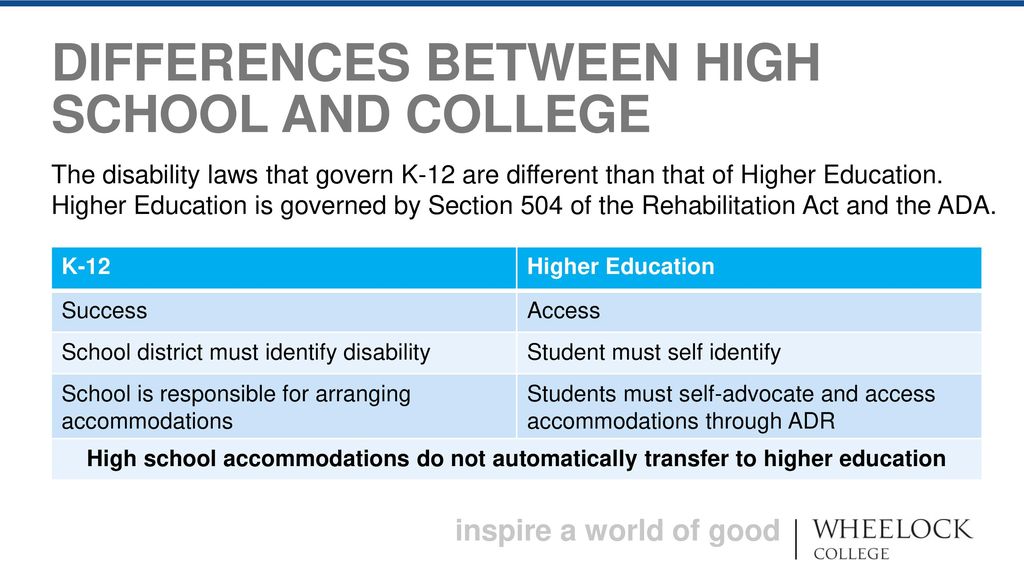
SELF ADVOCACY is the ability to understand and communicate one’s needs to other individuals, understanding your strengths and weaknesses, developing personal goals, being assertive and making decisions. Self-advocacy is essential to college success. Below are three key self-advocacy skills that are critical to college readiness:
1. UnderstandING rights and responsibilities: High school students, who are accustomed to taking a back seat to the expertise of parents and teachers, should be prepared to be an expert about their own needs and take the front seat when they arrive at college. Students will be responsible for disclosing their disability to the student accessibility office, submitting a request for accommodation, and working with their faculty to make plans to utilize approved accommodations.

2. ArticulatINg IMPACT of disability: Although families are usually partners in the college search and are often involved in initial conversations with accessibility offices, college-ready students should be prepared to lead those conversations. Disability professionals will expect students to be able to talk about what accommodations they are currently using and what they think they will need in college. Students need to be able to articulate what they see as their academic strengths and challenges. It’s helpful if students are prepared to answer the question: “What is difficult for you and what helps?”
3. RecognizING and admitTING strugglES: Colleges often have lots of resources available to students; students have access to faculty, advisors, residence coordinators, academic supports and disability office staff. Some colleges even have specialized supports for students with autism. However, students must be prepared to identify when they are struggling, be willing to reach out for support, and be open to trying new strategies. Being willing to accept help and utilize available resources is a critical skill and can mean the difference between success and failure. Before committing to a college, it’s a good idea to investigate the supports available and perhaps visit key offices during a college visit to get familiar with staff and procedures for utilizing the office. It can be helpful for families to talk together about which resources the student is committed to using as well as have a plan for regular communication about progress in case additional resources need to be put in place once the college journey begins.
Self-Care is any activity that we do deliberately in order to take care of our mental, emotional, and physical health. Good self-care skills are critical to college success. Below are four key skills that college-bound students should master before heading off:
4. managING medications: Medication can be an important component of care for students with autism who have co-occurring ADHD or other mental health conditions. However, medication adherence tends to drop off when students enter college. This could be related to the stigma of visiting the college health center or local pharmacy for refills, or students may feel that reliance on medication stifles their ability to finally “handle things on their own”. Students with autism may have trouble establishing new routines around fluctuating class schedules, or fall victim to “out of sight, out of mind” when medications are locked in a personal dorm safe. College-ready students should understand not only what medications they are prescribed and why they are important, but also what consequences they might face if they discontinue use. Being fully aware of how a medication contributes to their wellness will help students prioritize taking medication as prescribed. You may consider trying one of the many medication tracking apps available.
5. KEEPING A HEALTHY sleep routine: Sleep issues are very common for those on the autism spectrum and lack of sleep (quality or quantity) can have an detrimental impact on a college student’s social and academic success. We’ve seen too many students, especially those who struggle with procrastination or excessive gaming, stay up until the wee hours of the morning only to fall asleep at 6AM and miss a project due date, an entire day of classes, or an important exam. Once sleep patterns are interrupted, it can take a student several weeks to reverse their routine, leaving them severely behind academically. Before students arrive at college, they should have a good understanding of what helps them keep their sleep on track and have some tried and true strategies and tools that help them reset their body clock when things go awry.
6. ESTABLISHING A reliable hygiene routine: On a college campus, one student’s poor hygiene can impact an entire community, especially considering that college students both live and work in fairly close quarters with their peers. Families should have frank discussions with college-bound students about non-negotiable hygiene practices as well as the impact they can have on personal health and social success. Students should begin taking responsibility for washing their own clothes and bedsheets early in their high school career so they feel confident taking care of these tasks when they arrive at college. Students may need assistance creating a visual schedule of both morning and evening hygiene routines and posting those where they can readily be seen and referred to. I’ve read good things about the Brili app to help with establishing and monitoring routines.
7. Handling stresS: Eating well, exercising and getting enough sleep can go a long way toward keeping stress under control. However, students on the autism spectrum can experience unique stressors related to navigating social relationships, sensory sensitivities, and dealing with executive functioning weaknesses. Chronic stress can seriously impact physical and mental health so it’s important that students can identify the signs and symptoms of stress and confront it before it becomes debilitating. Arranging meetings with faculty, academic advisors, or tutors can help students make a concrete plan to deal with academic challenges that may be causing stress. Most colleges have campus counseling services that can help students discuss stressors. However, most campus counseling centers are overwhelmed by demand due to the rise in mental health needs and therefore may limit the number of sessions they offer to each student. It is important that students who have relied on regular support from school counselors or mental health professionals during high school make proactive plans to identify an off-campus mental health counselor so they can be assured ongoing mental health support.